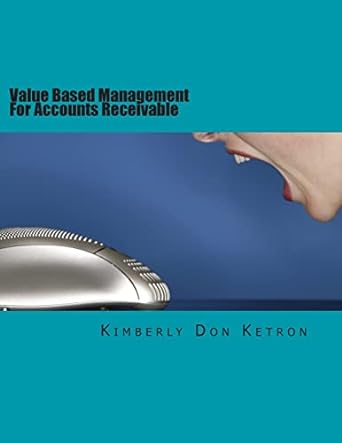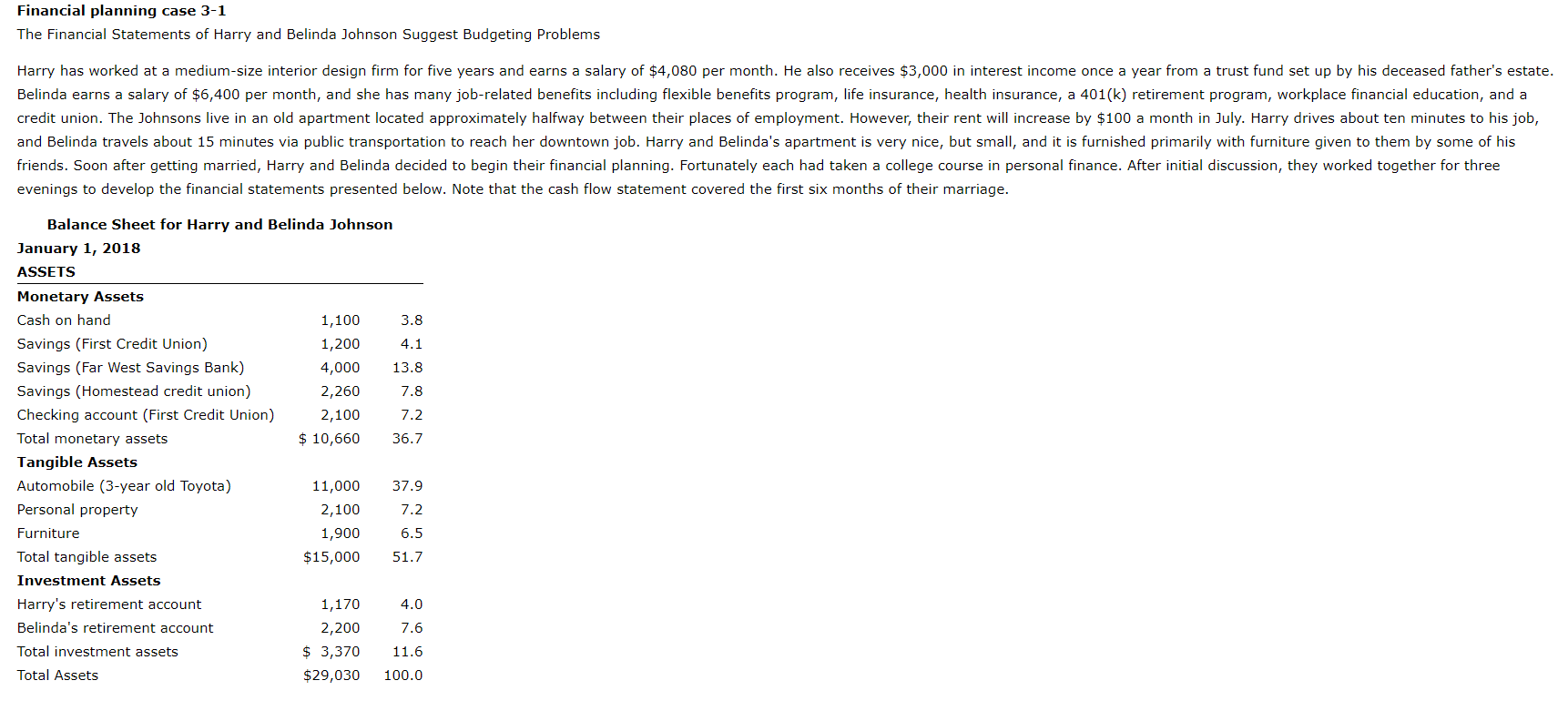
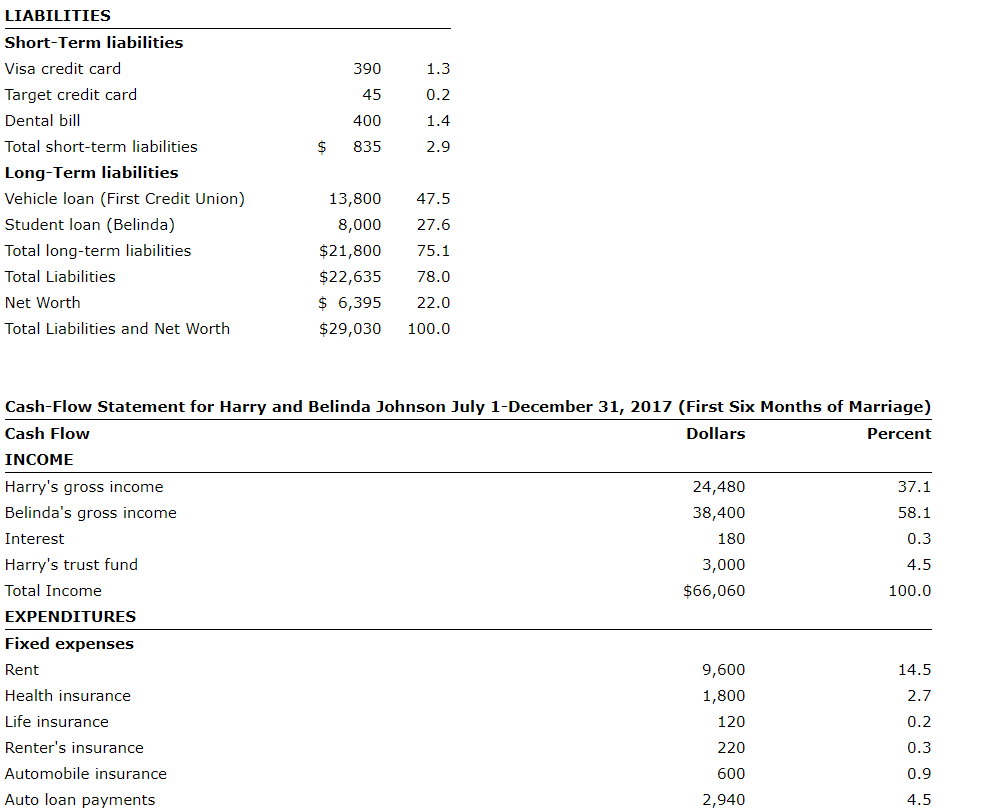
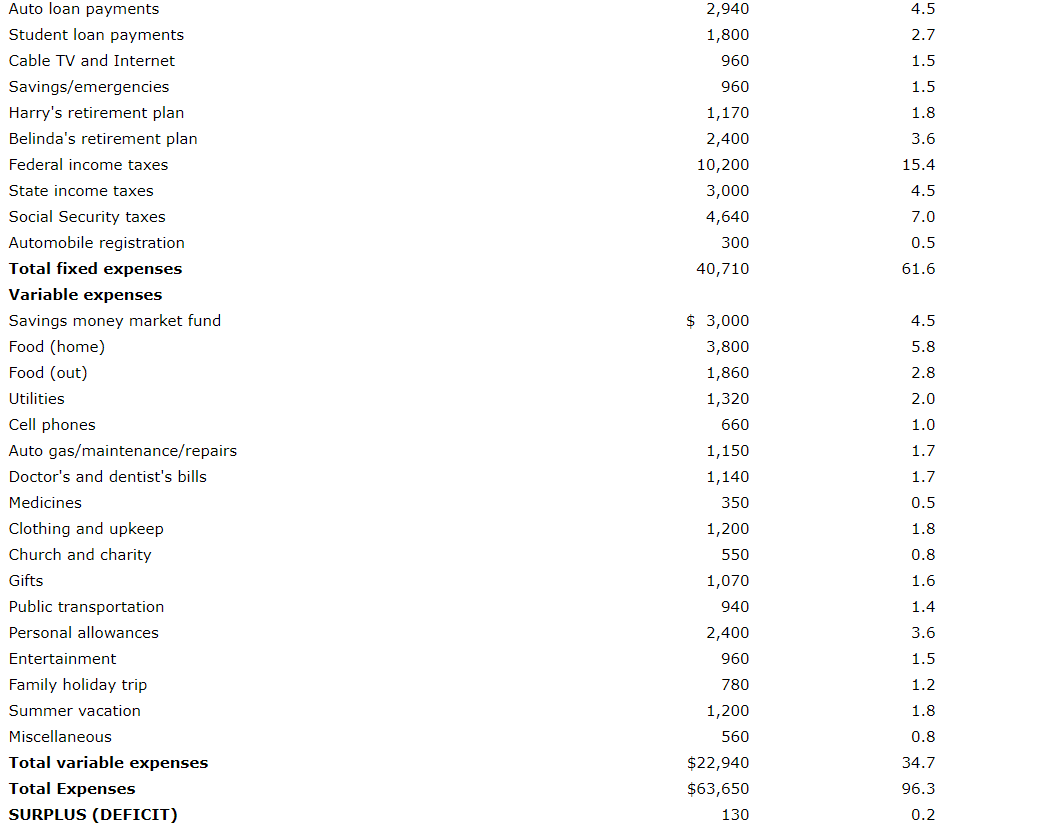
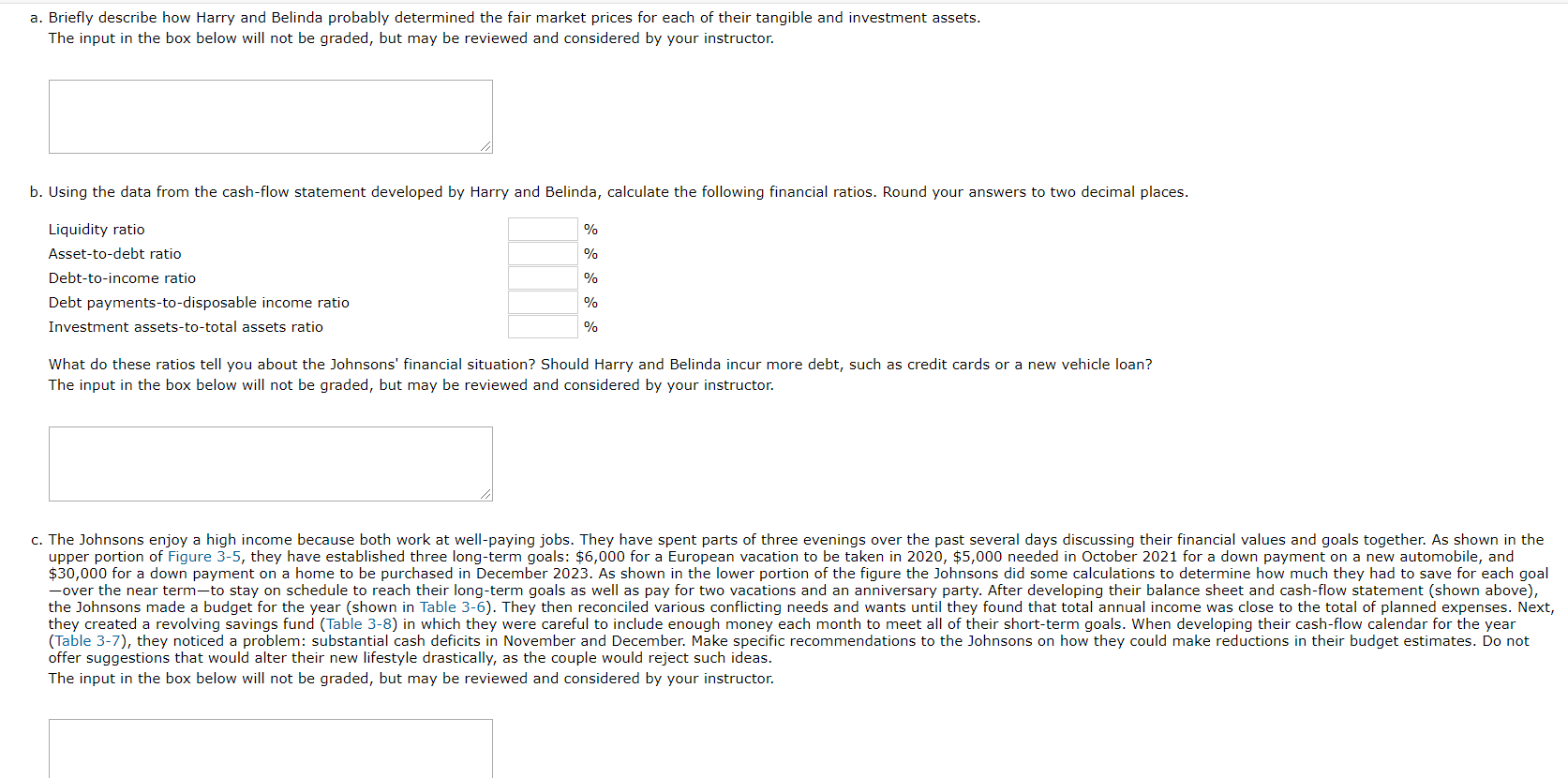
Financial planning case 3-1 The Financial Statements of Harry and Belinda Johnson Suggest Budgeting Problems Harry has worked at a medium-size interior design firm for five years and earns a salary of $4,080 per month. He also receives $3,000 in interest income once a year from a trust fund set up by his deceased father's estate. Belinda earns a salary of $6,400 per month, and she has many job-related benefits including flexible benefits program, life insurance, health insurance, a 401(k) retirement program, workplace financial education, and a credit union. The Johnsons live in an old apartment located approximately halfway between their places of employment. However, their rent will increase by $100 a month in July. Harry drives about ten minutes to his job, and Belinda travels about 15 minutes via public transportation to reach her downtown job. Harry and Belinda's apartment is very nice, but small, and it is furnished primarily with furniture given to them by some of his friends. Soon after getting married, Harry and Belinda decided to begin their financial planning. Fortunately each had taken a college course in personal finance. After initial discussion, they worked together for three evenings to develop the financial statements presented below. Note that the cash flow statement covered the first six months of their marriage. Balance Sheet for Harry and Belinda Johnson January 1, 2018 ASSETS Monetary Assets Cash on hand 1,100 3.8 Savings (First Credit Union) 1,200 4.1 Savings (Far West Savings Bank) 4,000 13.8 Savings (Homestead credit union) 2,260 7.8 Checking account (First Credit Union) 2,100 7.2 Total monetary assets $ 10,660 36.7 Tangible Assets Automobile (3-year old Toyota) 11,000 37.9 Personal property 2,100 7.2. Furniture 1,900 6.5 Total tangible assets $15,000 51.7 Investment Assets Harry's retirement account 1,170 4.0 Belinda's retirement account 2,200 7.6 Total investment assets $ 3,370 11.6 Total Assets $29,030 100.0 390 1.3 45 0.2 400 1.4 2.9 $ 835 LIABILITIES Short-Term liabilities Visa credit card Target credit card Dental bill Total short-term liabilities Long-Term liabilities Vehicle loan (First Credit Union) Student loan (Belinda) Total long-term liabilities Total Liabilities Net Worth Total Liabilities and Net Worth 13,800 8,000 $21,800 $22,635 $ 6,395 $29,030 47.5 27.6 75.1 78.0 22.0 100.0 Cash-Flow Statement for Harry and Belinda Johnson July 1-December 31, 2017 (First Six Months of Marriage) Cash Flow Dollars Percent INCOME Harry's gross income 24,480 37.1 Belinda's gross income 38,400 58.1 Interest 180 0.3 Harry's trust fund 3,000 4.5 Total Income $66,060 100.0 EXPENDITURES 14.5 2.7 Fixed expenses Rent Health insurance Life insurance Renter's insurance Automobile insurance Auto loan payments 9,600 1,800 120 220 600 2,940 0.2 0.3 0.9 4.5 4.5 2.7 1.5 1.5 2,940 1,800 960 960 1,170 2,400 10,200 3,000 4,640 300 40,710 1.8 3.6 15.4 4.5 7.0 0.5 61.6 Auto loan payments Student loan payments Cable TV and Internet Savings/emergencies Harry's retirement plan Belinda's retirement plan Federal income taxes State income taxes Social Security taxes Automobile registration Total fixed expenses Variable expenses Savings money market fund Food (home) Food (out) Utilities Cell phones Auto gas/maintenance/repairs Doctor's and dentist's bills Medicines Clothing and upkeep Church and charity 4.5 5.8 2.8 2.0 1.0 1.7 1.7 0.5 1.8 0.8 $ 3,000 3,800 1,860 1,320 660 1,150 1,140 350 1,200 550 1,070 940 2,400 960 780 1,200 560 $22,940 $63,650 130 Gifts 1.6 1.4 3.6 1.5 1.2 Public transportation Personal allowances Entertainment Family holiday trip Summer vacation Miscellaneous Total variable expenses Total Expenses SURPLUS (DEFICIT) 1.8 0.8 34.7 96.3 0.2 a. Briefly describe how Harry and Belinda probably determined the fair market prices for each of their tangible and investment assets. The input in the box below will not be graded, but may be reviewed and considered by your instructor. b. Using the data from the cash-flow statement developed by Harry and Belinda, calculate the following financial ratios. Round your answers to two decimal places. % % Liquidity ratio Asset-to-debt ratio Debt-to-income ratio Debt payments-to-disposable income ratio Investment assets-to-total assets ratio % % % What do these ratios tell you about the Johnsons' financial situation? Should Harry and Belinda incur more debt, such as credit cards or a new vehicle loan? The input in the box below will not be graded, but may be reviewed and considered by your instructor. c. The Johnsons enjoy a high income because both work at well-paying jobs. They have spent parts of three evenings over the past several days discussing their financial values and goals together. As shown in the upper portion of Figure 3-5, they have established three long-term goals: $6,000 for a European vacation to be taken in 2020, $5,000 needed in October 2021 for a down payment on a new automobile, and $30,000 for a down payment on a home to be purchased in December 2023. As shown in the lower portion of the figure the Johnsons did some calculations to determine how much they had to save for each goal -over the near term-to stay on schedule to reach their long-term goals as well as pay for two vacations and an anniversary party. After developing their balance sheet and cash-flow statement (shown above), the Johnsons made a budget for the year (shown in Table 3-6). They then reconciled various conflicting needs and wants until they found that total annual income was close to the total of planned expenses. Next, they created a revolving savings fund (Table 3-8) in which they were careful to include enough money each month to meet all of their short-term goals. When developing their cash-flow calendar for the year (Table 3-7), they noticed a problem: substantial cash deficits in November and December. Make specific recommendations to the Johnsons on how they could make reductions in their budget estimates. Do not offer suggestions that would alter their new lifestyle drastically, as the couple would reject such ideas. The input in the box below will not be graded, but may be reviewed and considered by your instructor. Financial planning case 3-1 The Financial Statements of Harry and Belinda Johnson Suggest Budgeting Problems Harry has worked at a medium-size interior design firm for five years and earns a salary of $4,080 per month. He also receives $3,000 in interest income once a year from a trust fund set up by his deceased father's estate. Belinda earns a salary of $6,400 per month, and she has many job-related benefits including flexible benefits program, life insurance, health insurance, a 401(k) retirement program, workplace financial education, and a credit union. The Johnsons live in an old apartment located approximately halfway between their places of employment. However, their rent will increase by $100 a month in July. Harry drives about ten minutes to his job, and Belinda travels about 15 minutes via public transportation to reach her downtown job. Harry and Belinda's apartment is very nice, but small, and it is furnished primarily with furniture given to them by some of his friends. Soon after getting married, Harry and Belinda decided to begin their financial planning. Fortunately each had taken a college course in personal finance. After initial discussion, they worked together for three evenings to develop the financial statements presented below. Note that the cash flow statement covered the first six months of their marriage. Balance Sheet for Harry and Belinda Johnson January 1, 2018 ASSETS Monetary Assets Cash on hand 1,100 3.8 Savings (First Credit Union) 1,200 4.1 Savings (Far West Savings Bank) 4,000 13.8 Savings (Homestead credit union) 2,260 7.8 Checking account (First Credit Union) 2,100 7.2 Total monetary assets $ 10,660 36.7 Tangible Assets Automobile (3-year old Toyota) 11,000 37.9 Personal property 2,100 7.2. Furniture 1,900 6.5 Total tangible assets $15,000 51.7 Investment Assets Harry's retirement account 1,170 4.0 Belinda's retirement account 2,200 7.6 Total investment assets $ 3,370 11.6 Total Assets $29,030 100.0 390 1.3 45 0.2 400 1.4 2.9 $ 835 LIABILITIES Short-Term liabilities Visa credit card Target credit card Dental bill Total short-term liabilities Long-Term liabilities Vehicle loan (First Credit Union) Student loan (Belinda) Total long-term liabilities Total Liabilities Net Worth Total Liabilities and Net Worth 13,800 8,000 $21,800 $22,635 $ 6,395 $29,030 47.5 27.6 75.1 78.0 22.0 100.0 Cash-Flow Statement for Harry and Belinda Johnson July 1-December 31, 2017 (First Six Months of Marriage) Cash Flow Dollars Percent INCOME Harry's gross income 24,480 37.1 Belinda's gross income 38,400 58.1 Interest 180 0.3 Harry's trust fund 3,000 4.5 Total Income $66,060 100.0 EXPENDITURES 14.5 2.7 Fixed expenses Rent Health insurance Life insurance Renter's insurance Automobile insurance Auto loan payments 9,600 1,800 120 220 600 2,940 0.2 0.3 0.9 4.5 4.5 2.7 1.5 1.5 2,940 1,800 960 960 1,170 2,400 10,200 3,000 4,640 300 40,710 1.8 3.6 15.4 4.5 7.0 0.5 61.6 Auto loan payments Student loan payments Cable TV and Internet Savings/emergencies Harry's retirement plan Belinda's retirement plan Federal income taxes State income taxes Social Security taxes Automobile registration Total fixed expenses Variable expenses Savings money market fund Food (home) Food (out) Utilities Cell phones Auto gas/maintenance/repairs Doctor's and dentist's bills Medicines Clothing and upkeep Church and charity 4.5 5.8 2.8 2.0 1.0 1.7 1.7 0.5 1.8 0.8 $ 3,000 3,800 1,860 1,320 660 1,150 1,140 350 1,200 550 1,070 940 2,400 960 780 1,200 560 $22,940 $63,650 130 Gifts 1.6 1.4 3.6 1.5 1.2 Public transportation Personal allowances Entertainment Family holiday trip Summer vacation Miscellaneous Total variable expenses Total Expenses SURPLUS (DEFICIT) 1.8 0.8 34.7 96.3 0.2 a. Briefly describe how Harry and Belinda probably determined the fair market prices for each of their tangible and investment assets. The input in the box below will not be graded, but may be reviewed and considered by your instructor. b. Using the data from the cash-flow statement developed by Harry and Belinda, calculate the following financial ratios. Round your answers to two decimal places. % % Liquidity ratio Asset-to-debt ratio Debt-to-income ratio Debt payments-to-disposable income ratio Investment assets-to-total assets ratio % % % What do these ratios tell you about the Johnsons' financial situation? Should Harry and Belinda incur more debt, such as credit cards or a new vehicle loan? The input in the box below will not be graded, but may be reviewed and considered by your instructor. c. The Johnsons enjoy a high income because both work at well-paying jobs. They have spent parts of three evenings over the past several days discussing their financial values and goals together. As shown in the upper portion of Figure 3-5, they have established three long-term goals: $6,000 for a European vacation to be taken in 2020, $5,000 needed in October 2021 for a down payment on a new automobile, and $30,000 for a down payment on a home to be purchased in December 2023. As shown in the lower portion of the figure the Johnsons did some calculations to determine how much they had to save for each goal -over the near term-to stay on schedule to reach their long-term goals as well as pay for two vacations and an anniversary party. After developing their balance sheet and cash-flow statement (shown above), the Johnsons made a budget for the year (shown in Table 3-6). They then reconciled various conflicting needs and wants until they found that total annual income was close to the total of planned expenses. Next, they created a revolving savings fund (Table 3-8) in which they were careful to include enough money each month to meet all of their short-term goals. When developing their cash-flow calendar for the year (Table 3-7), they noticed a problem: substantial cash deficits in November and December. Make specific recommendations to the Johnsons on how they could make reductions in their budget estimates. Do not offer suggestions that would alter their new lifestyle drastically, as the couple would reject such ideas. The input in the box below will not be graded, but may be reviewed and considered by your instructor










